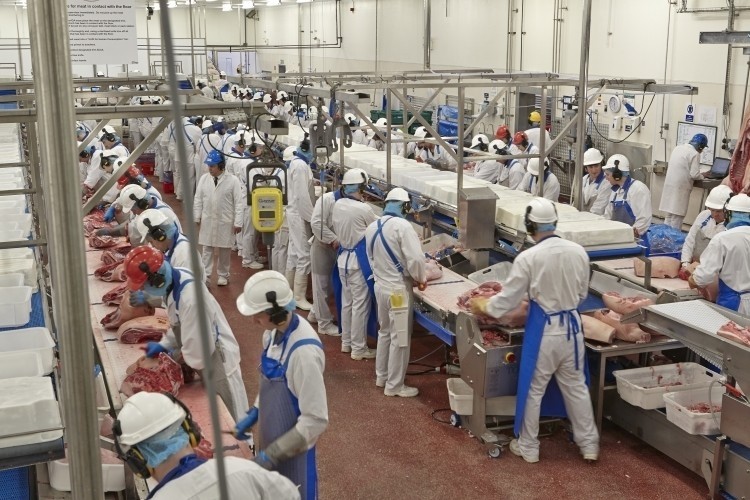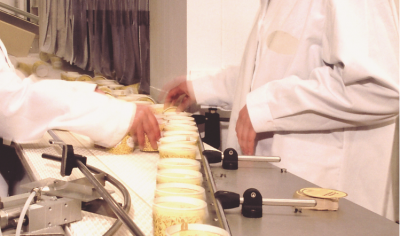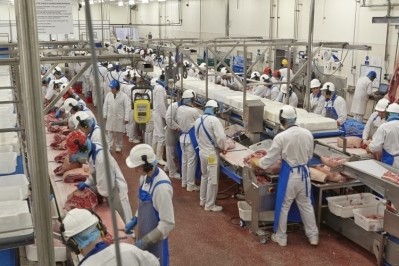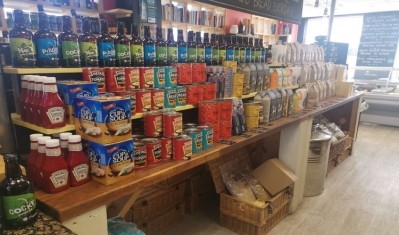Measures for meat sector and general food production outlined
Coronavirus plans for meat plants and abattoirs

The war being waged against the pandemic is not just being fought by NHS staff, but also by food factory workers with lower profiles and the meat industry is under heavy fire.
Large plants employing hundreds of workers on production lines have faced unrest from staff concerned about poor observance of social distancing rules and lack of personal protective equipment (PPE). They fear they could be infected by the virus and that, in turn, they could infect their families. As a result, there have been instances of walkouts by sections of the workforce, interfering with output.
Elsewhere, abattoirs and cutting plants may be threatened by insufficient supervision by official veterinarians (OVs) or meat hygiene inspectors (MHIs) because of COVID-19-related sickness. There are also concerns over shortages of hand sanitisers and cleaning materials in the face of high demand from consumers and the healthcare sector.
However, Sullivan told Food Manufacture that plans were in place to address these challenges.
Official veterinarians and meat hygiene inspectors
On the potential lack of availability of OVs and MHIs, he said the FSA had identified a reserve force of reinforcements following a summit held with meat businesses on 12 March: “We are conscious that the modelling suggests that, at any one time, you could lose 20% of your staff. We took a pragmatic and prudent approach where we might lose more than that, perhaps 30%-40%. That’s not proving to be the case so far. The numbers we have absent are way down on that.
“The first thing to do was to look to see how many staff who were qualified OVs and MHIs weren’t working on the line – they were in other parts of the agency. We found we had 150 of those staff doing other jobs, whether that be policy jobs or administration. Some were in the National Food Crime Unit.
“Just to give you the scale of this, we currently have in England and Wales around 270 OVs and 600 MHIs, so if at any one time you are to lose 30%, you're looking at around 80 OVs required and 180 MHIs.”
Not only could the FSA draw on the reserve force of 150, but other avenues were also open to draft more people in, said Sullivan. “Another action was to look to see what retirees could do and I’m very conscious there’s guidance about vulnerable people. Part of that is those with underlying conditions, but also those with an age of 70 and over. We have been very careful to look to see who we could attract back who were young retirees.
“We’ve also looked to see what other contracts we can pull off colleagues from. We're able to pull off the APHA [Animal and Plant Health Agency] contract and they have been assisting us in respect of that. There’s also the possibility that we attract other vets who don't have the OV qualifications.” Other vets who had planned holidays but were now unable to do so would also be available to draw on.
Demand for staff falls as exports suffer
However, demand for staff overall has fallen. Exports, particularly for lamb, were suffering as many international markets remained locked down, according to AHDB. This, in turn, had led to plants shutting, said Sullivan. “There are a number of cutting plants - around 50 - currently closed or on reduced working. There are about ten abattoirs that are currently not working or on reduced hours.” As a consequence, an average of 10% of meat processing staff were absent.
“The pressure isn’t there at the moment. I’m not saying it’s not going to come. We’re very closely monitoring, working very closely with the industry on a regular basis, but also on a daily basis with different FBOs [food business operators] and meat representative bodies.”
FSA approach to contingency planning
- Public health, food safety, animal health and welfare will remain the overarching priority in all decisions.
- Any changes are strictly time-limited – with an expectation to return to the ‘status quo’ as soon as possible (except in some limited circumstances agreed by the FSA).
- Measures are implemented as consistently as possible, but taking into account the circumstances of individual FBOs, including their compliance history.
- Resource planning will be managed at a geographical level, which may mean prioritisation of some specific parts of the industry, while taking into account throughput and animal welfare issues, including at producer level.
- Urgent reactive work will continue, for example responding to animal welfare breaches or food incidents.
Should absences make it difficult for the FSA “to sustain a sufficient service across the board”, Sullivan said it had issued guiding principles on 31 March that focused on core priorities. Temporary “flexibilities” or “relaxations” of some services were sanctioned in those circumstances. This could be applied differently in different UK regions depending on the pressures they were each under.
Such scaling-back on operations could include suspending audits for businesses that had historically high audit ratings, fewer unannounced inspections, and fewer dairy hygiene inspections. These measures dovetail with the FSA's emergency advice to local authorities (LAs) for food processors outside the meat sector, where the LAs have oversight.
FSA local authority advice
- On 20 March, the FSA advised local authorities to defer all planned feed, food hygiene and food standards inspections and other interventions until 17 April 2020 to minimise unnecessary visits and to maximise local authority resources for urgent reactive work
- Such reactive work includes responding to other feed or food incidents and investigating foodborne illness outbreaks as well as following up on intelligence in response to the coronavirus outbreak and proactively checking food businesses with lower Food Hygiene Ratings (ratings of 0, 1 or 2) to identify any potential risks to consumers
- The FSA is now considering the direction it will give after 17 April, accounting for the changing situation and LA feedback.
FSA has more leeway
In addition, official control regulations for the meat industry changed in December 2019, giving the FSA more leeway. “Under our operational transformations programme we were planning to bring those in, we are going to accelerate the introduction of those. That gives us the opportunity to bring in some freedoms.
“For example under the official control regulations it’s possible to have ante-mortem inspections being carried out on farms instead of at the slaughterhouse. That can release resources in the slaughterhouse. It’s possible to do postmortem inspection via an MHI, not necessarily having the OV in attendance, but under the OV’s responsibility. Again, that can release official veterinarians.”
The key was targeting changes that would not add to food safety risks. “The one thing we are really focused on is not to create any difficulties in terms of foodborne disease at a time when the health service is struggling.”
The FSA could increase its flexibility via emergency EU Regulation 466/2020 that could still be implemented because the UK was still in the Brexit transition period. “It is a piece of legislation which allows some relaxation of official controls. It allows less qualified staff to undertake roles that would otherwise be undertaken by fully qualified staff under their supervision. It allows you to exercise those freedoms for two months only when absolutely necessary and for no longer than is necessary.”
The FSA's temporary flexible approach
- Prioritising activity: including deferring scheduled audits for sites with higher audit outcomes (good and generally satisfactory) until the end of June to maximise resources
- Using existing legislation to support a reduced FSA workforce: these include using other qualified individuals to carry out roles and extending some inspection deadlines to maximise resources
- Trained FSA staff are returning to the front line to provide additional resources and support
- Assessing additional measures under temporary legislation: The European Commission brought out new regulations at the end of March which mean it can be even more flexible about the way it operates controls. It is developing proposals to take advantage of these flexibilities, if it proves necessary
PPE and social distancing
Regarding PPE and social distancing, Sullivan said: “Those that wish to provide PPE are probably finding it difficult to acquire it. We issued a letter to meat bodies, because it’s not always possible to have two metres social distancing. That highlighted some of the things food businesses could do. It might mean putting up screens, it might mean providing PPE, it might mean slowing the line if it’s a meat processing plant.”
Commenting on the use of face masks, the latest guidance stated that they were not recommended outside of a clinical setting, he added: “What we have said to our staff in meat plants, that’s our OVs and our MHIs, is that we will provide visors and they can use them if they wish to, so it's not a mandatory requirement.” The FSA was “in the process of sourcing” the visors and this would take “days rather than weeks”. The Government is currently not recommending face masks as an effective means of preventing the spread of infection.
Hand sanitisers and cleaning materials
As far as the availability of hand sanitisers and cleaning materials for the whole food industry was concerned, he said: “I have heard reports that it has been difficult for some food businesses to find them and they have done what they can in terms of hot water and soap. They have followed the advice from PHE [Public Health England] which is about frequent hand-washing on a regular basis and thoroughly doing it.” Securing adequate supplies was “a matter for food businesses themselves”. "It’s not a responsibility of the FSA. Our responsibility in terms of official controls is to oversee that work.”
Food businesses were advised to follow the latest Government guidance on operational procedures in relation to coronavirus, as well as general business guidance.
Sullivan said his colleagues were reporting the past days fighting against the virus as “amongst the busiest of their careers”. “I’m talking to colleagues who are getting up at five and six in the morning and working to midnight.”















